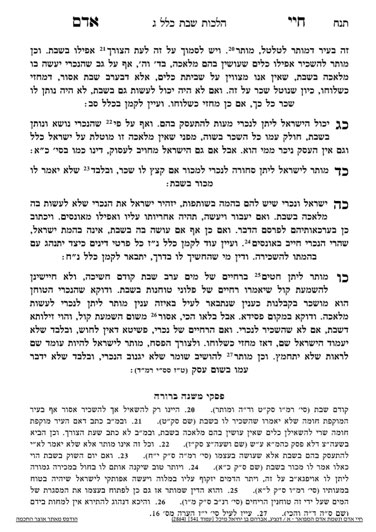Be’ezras Hashem, our 100th Shabbos shiur is coming up soon, and is available for sponsorship! Please contact shiurim@dvarhalacha.com for more information.
We are beginning siman 26. A person is allowed to set melacha in motion on Erev Shabbos with the melacha continuing into Shabbos, because there is no melacha being done on Shabbos itself. When we discussed putting food up from Erev Shabbos going into Shabbos (Klal 2), the concern was not the fact that the food was being placed on the fire (before Shabbos), but that one may end up performing a melacha ( on Shabbos) with the food while it is cooking (stirring the coals, etc. See, for example, S0037). Otherwise, leaving something going is muttar, which is how we can leave on our lights, air conditioning sprinkler systems and many other things on Shabbos.
The Chayei Adam gives an example of a millstone. He writes that it is muttar to place wheat kernels into the hopper of a watermill before Shabbos, even though the water will cause the wheat to be ground over Shabbos.
However, the Chayei Adam adds a caveat. A mill is extremely loud, and when it was not being used, the water was diverted away from the mill. Thus, one would think that it should be assur due to maris ayin generated from the loud noises produced by the mill. However, the Chayei Adam writes that there is no concern for maris ayin, because people know that it is standard usage of the mill to load it up before Shabbos, so they will not assume the Jew is doing something assur.
Nevertheless, the Chayei Adam will draw on another issue of the noise generated by the mill; see below.
Generally, one has a miller who oversees the grinding process. In this case, the miller must be a non-Jew, he must be a kablan, and he must be paid through ketzitzah, as we have discussed previously.
The Chayei Adam concludes that this leniency of running the mill on Shabbos by putting grain into the hopper before Shabbos is only muttar when there is a financial loss at play. If there is no financial loss, it is assur, because the loud noises generated by these types of machines detract from Shabbos. This is known as zilusa d’Shabbos, degrading Shabbos.
Summary
It is muttar to set melacha in motion before Shabbos which will operate over Shabbos with two conditions.
- One must be concerned for maris ayin, but there is no issue of maris ayin if it is something which is standard to derive benefit from on Shabbos due to having set it in motion before Shabbos.
- One must also be concerned about zilusa d’Shabbos, but can be meikil in a case of financial loss.



